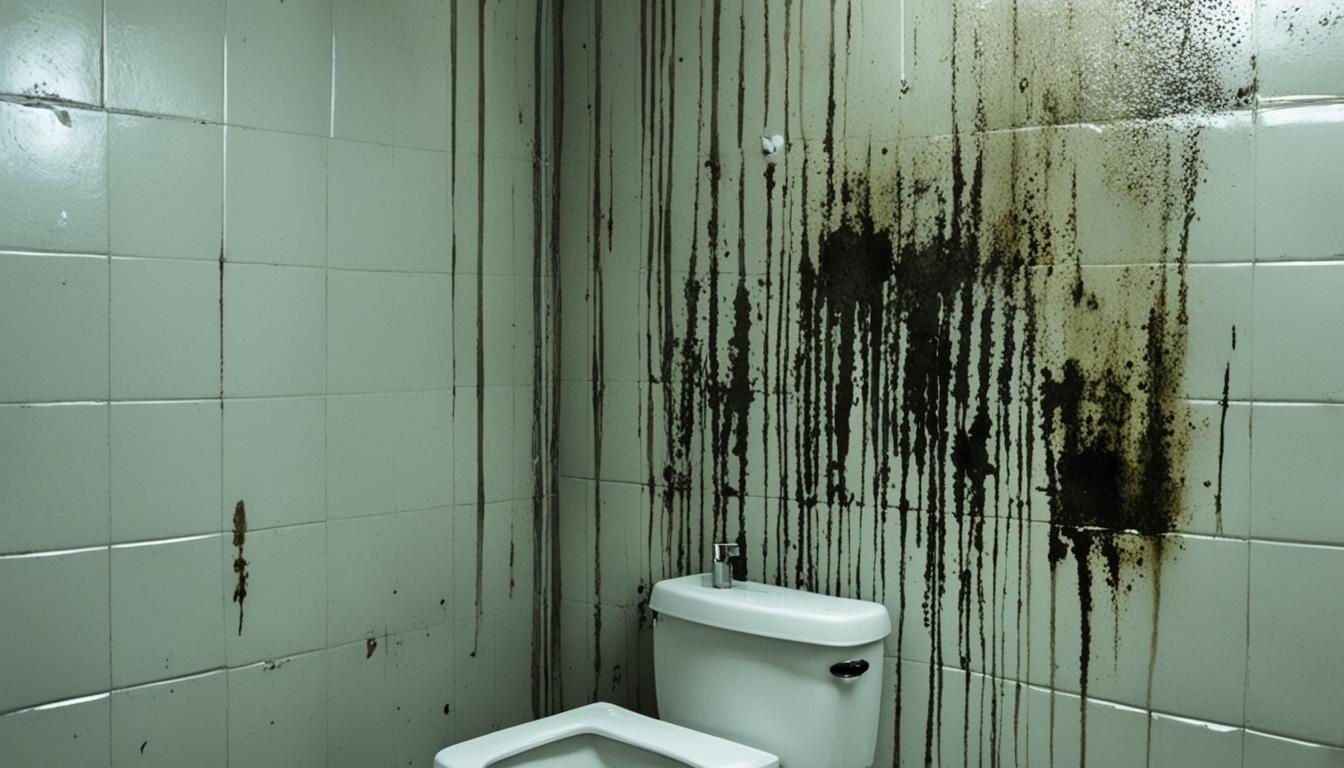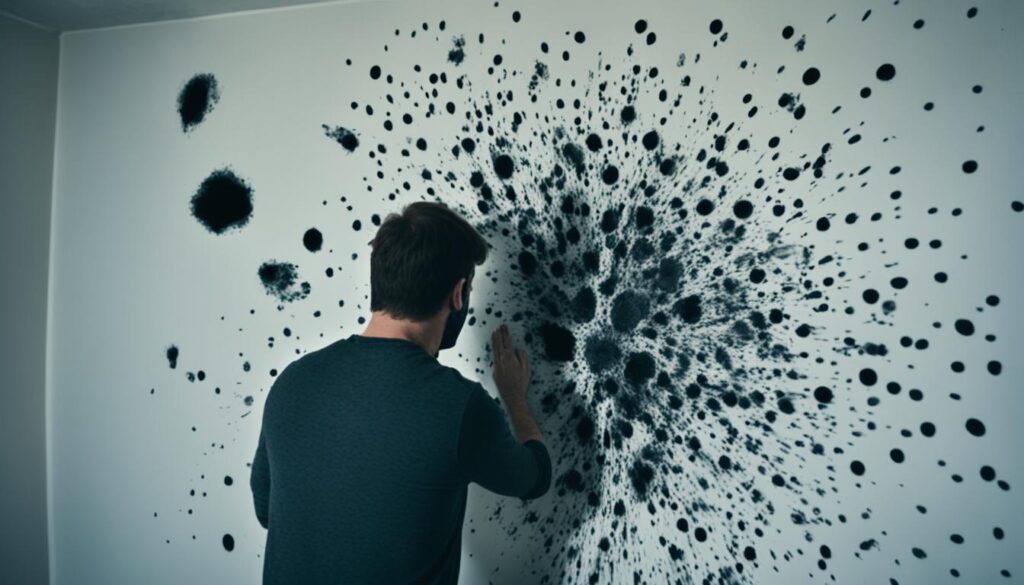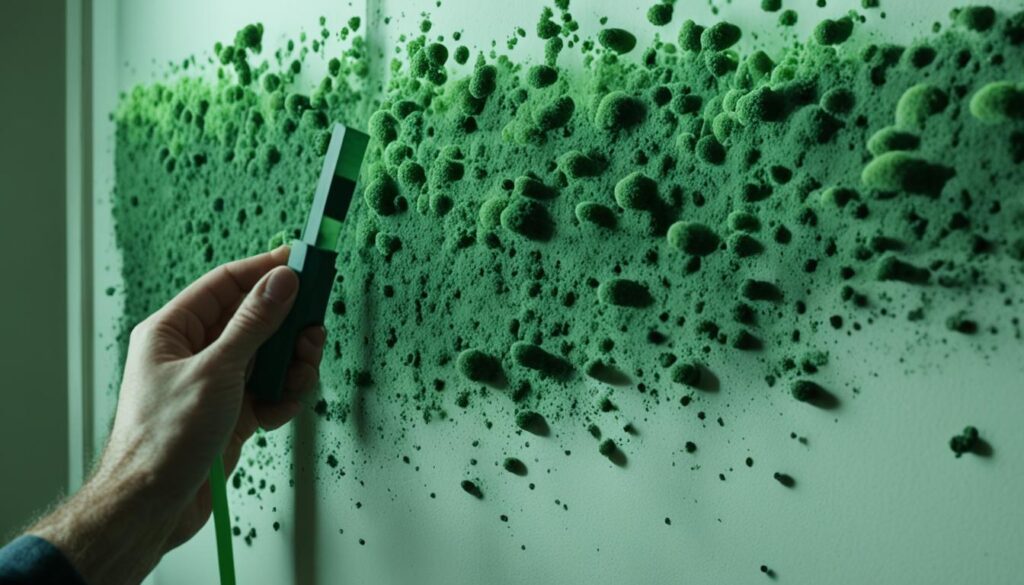
Black Mold in an Apartment: Health Risks & Solutions
Welcome to our comprehensive guide on black mold in apartments. In this article, we will explore the health risks associated with black mold exposure and provide solutions to address this issue effectively. Whether you are a tenant or a landlord, it is crucial to understand the potential dangers of black mold and take appropriate measures to safeguard your health and the well-being of your living space.
Black mold, also known as Stachybotrys chartarum, can thrive in moist environments such as bathrooms, basements, and areas with water damage. Its presence can lead to various health problems, especially when left untreated. These health risks range from respiratory issues, allergies, and skin irritation to more severe symptoms like neurological disorders and chronic fatigue.
To ensure your safety and the safety of others living in your apartment complex, it is essential to identify and address black mold promptly. In our upcoming sections, we will discuss the steps to identify and address black mold in apartments, the importance of professional mold testing, and the services offered by mold removal companies.
Key Takeaways:
- Black mold in an apartment can pose significant health risks if left untreated.
- Symptoms of black mold exposure range from respiratory issues to neurological disorders.
- Identifying and addressing black mold promptly is crucial for the well-being of tenants and landlords.
- Professional mold testing in apartments can accurately diagnose the problem and determine its severity.
- Mold removal companies provide valuable services for effective black mold remediation.
At Fix Mold Miami, we are dedicated to helping you with all your mold assessment, prevention, and remediation needs. Contact us at 305-465-6653 to schedule an appointment or to learn more about our services. Don’t let black mold compromise your health – take action today!
Health Risks of Black Mold in Apartments
Exposure to black mold in apartments can have serious health consequences. It is important to understand the potential risks associated with toxic mold symptoms and black mold exposure. Individuals exposed to black mold may experience a range of health issues, including:
- Respiratory Issues: Black mold can trigger or exacerbate respiratory conditions such as asthma, coughing, wheezing, and shortness of breath.
- Allergies: Mold spores can cause allergic reactions, leading to symptoms such as sneezing, runny nose, itchy eyes, and skin rashes.
- Neurological Symptoms: Prolonged exposure to black mold can affect the central nervous system, potentially causing headaches, dizziness, cognitive impairment, and mood swings.
Additionally, individuals with compromised immune systems or pre-existing respiratory conditions may be more susceptible to the negative effects of black mold exposure.
Black mold exposure can also have long-term effects on overall health. Chronic exposure may contribute to the development of respiratory diseases, such as chronic bronchitis and asthma. Furthermore, it has been linked to the onset or worsening of neurological disorders, including memory loss, difficulty concentrating, and depression.
It is essential to take swift action when black mold is suspected in an apartment to mitigate the health risks associated with exposure. Seeking professional assistance from mold removal experts, like Fix Mold Miami, can ensure thorough mold assessment, remediation, and prevention efforts. Fix Mold Miami is Florida’s highest-rated service provider for mold assessments, prevention, and remediation.
Contact Fix Mold Miami at 305-465-6653 for expert assistance in addressing black mold in your apartment.

Identifying and Addressing Black Mold in Apartments
When it comes to black mold in apartments, swift action is crucial. Identifying and addressing the issue promptly can help prevent potential health risks and extensive damage to the property. In this section, we will guide you through the necessary steps to tackle black mold in apartments effectively.
The Importance of Mold Testing in Apartments
In order to accurately assess the severity of black mold in your apartment, mold testing is essential. Professional mold testing in apartments can determine the type and concentration of mold, providing valuable information for targeted remediation efforts. It helps ensure that the appropriate measures are taken to eliminate the mold problem.
During the mold testing process, samples are collected from different areas of the apartment and analyzed by experts. This analysis helps determine the extent of mold growth and identify any underlying issues that may be contributing to mold growth, such as water leaks or high humidity levels.
Apartment Mold Cleanup: Do It Right
Once black mold has been identified, it’s crucial to perform apartment mold cleanup properly to prevent further contamination and ensure the health and safety of occupants. Here are some guidelines to follow during the cleanup process:
- Wear protective gear, including gloves, goggles, and a mask to avoid direct contact with mold spores and prevent inhalation.
- Isolate the affected area by sealing off doors and windows to contain the mold and prevent its spread.
- Remove any porous materials, such as carpets or wallpaper, that are heavily contaminated and cannot be effectively cleaned. Dispose of them properly following local regulations.
- Clean non-porous surfaces, such as tiles or countertops, using a solution of bleach and water. Follow the cleaning instructions provided by the Environmental Protection Agency (EPA) for effective mold removal.
- Thoroughly dry the area to discourage mold regrowth. Use dehumidifiers and fans to enhance airflow and reduce moisture levels.
It’s important to note that if the affected area is larger than 10 square feet or if there is extensive structural damage, it is recommended to seek professional assistance from mold remediation companies. They have the expertise and specialized equipment to handle larger-scale mold cleanup safely and efficiently.
Responsibilities of Landlords and Tenants
Dealing with mold in rental units requires collaboration between landlords and tenants to ensure a safe and healthy living environment. Here are the responsibilities of each party:
Landlords:
- Regularly inspect the property for any signs of water leaks or moisture issues that could contribute to mold growth.
- Promptly address reported mold concerns and initiate necessary remediation measures.
- Ensure proper ventilation and maintenance of HVAC systems to prevent moisture buildup.
- Provide tenants with information regarding mold prevention and the steps they should take if mold is detected.
Tenants:
- Maintain reasonable cleanliness and promptly report any signs of mold to the landlord.
- Take necessary precautions, such as using exhaust fans during showers and promptly drying any water spills or leaks.
- Cooperate with the landlord during mold remediation efforts and follow any instructions provided to prevent further mold growth.
By working together, landlords and tenants can effectively address and prevent mold issues, ensuring a safe and healthy living environment for all.

| Mold Remediation Companies | Contact Information |
|---|---|
| Fix Mold Miami | 305-465-6653 |
Conclusion
In conclusion, black mold in an apartment poses significant health risks that should not be taken lightly. Individuals exposed to black mold may experience a range of symptoms, including respiratory issues, allergies, and neurological symptoms. The long-term effects of black mold exposure on overall health are also a cause for concern.
It is crucial to identify and address black mold in apartments promptly. Mold testing in apartments is essential to accurately diagnose the problem and determine its severity. While apartment mold cleanup can be done by individuals, seeking professional assistance from mold remediation companies may be necessary for more extensive cases.
Prevention is key in ensuring indoor mold-free environments in apartments. Taking proactive measures, such as maintaining proper ventilation, controlling humidity levels, and promptly addressing water leaks and moisture issues, can help prevent the growth of black mold. Regular inspections and maintenance can also contribute to early detection and mitigation of mold problems.
If you suspect black mold in your apartment or require professional mold assessments, prevention, and remediation services, consider contacting Fix Mold Miami. With a reputation for excellence, Fix Mold Miami offers comprehensive solutions to address black mold in apartments. You can reach Fix Mold Miami at 305-465-6653.




